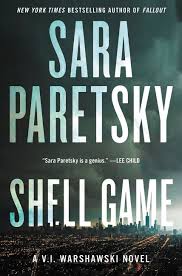This week I discovered an infected molar was causing my acute sinus pain. I swear I was at death’s door until the tooth was extracted. I took a lot of Ibuprofen, which dulls the pain but made me groggy. In the rare hours I was awake, I managed to read two engrossing novels, Sara Paretsky’s Shell Game and Lewis Grassic Gibbon’s Sunset Song.
 Sara Paretsky is at the top of her game in the 20th novel in the V.I. Warshawski series, Shell Game. V.I. Warshawki, a private investigator in Chicago, must solve two cases: her friend Lotty Herschel’s nephew, a Canadian engineering student at the University of Chicago, is accused of the murder of an unidentified man; and her niece, a prostitute’s daughter with an associate’s degree who recently was singled out by her corporate employer, has disappeared. The investigation turns up smuggled archaeological artifacts, Homeland Security’s harassment of a group of students from the Middle East, and a corporation’s exploitation of poor people in a stock scam. Paretsky’s writing is so honed that you admire her style as much as the plot.
Sara Paretsky is at the top of her game in the 20th novel in the V.I. Warshawski series, Shell Game. V.I. Warshawki, a private investigator in Chicago, must solve two cases: her friend Lotty Herschel’s nephew, a Canadian engineering student at the University of Chicago, is accused of the murder of an unidentified man; and her niece, a prostitute’s daughter with an associate’s degree who recently was singled out by her corporate employer, has disappeared. The investigation turns up smuggled archaeological artifacts, Homeland Security’s harassment of a group of students from the Middle East, and a corporation’s exploitation of poor people in a stock scam. Paretsky’s writing is so honed that you admire her style as much as the plot.
The Scottish writer Lewis Grassic Gibbon’s lyrical novel Sunset Song (1932) is the first in the trilogy A Scots Quair and one of my favorite books. A film adaptation of Sunset Song was released in 2015, and there is an excellent 1971 BBC series of Sunset Song (free on YouTube).
It belongs to the subgenre of “the novel of peasant crisis,” along with classics like Steinbeck’s The Grapes of Wrath, says Thomas Crawford in the introduction to the Canongate edition. Sunset Song, set on a hardscrabble farm in Scotland, opens in 1911. The heroine Chris Guthrie, a farmer’s daughter, loves the beauty of the land but has divided loyalties; she is also the best scholar at school, where she studies English, French, Greek, and Latin, among other subjects. She hopes to become a teacher.
Life interferes, as we know it will. Her father, a hard-working but moody poor farmer, is verbally abusive, forever raging, and ignores the toll of childbirth on Chris’s mother, who almost dies after having twins. When she gets pregnant again, she kills herself and the twins. Chris survives this tragedy but must drop out of school. She falls in love unexpectedly with a farm laborer. Is it worth it? She thinks so. Alas, World War I turns her world to dust.
But life goes on. Chris is a survivor and an optimist.



